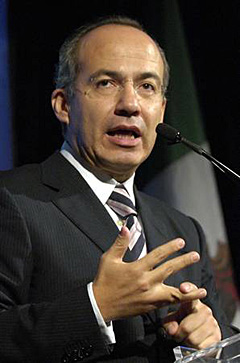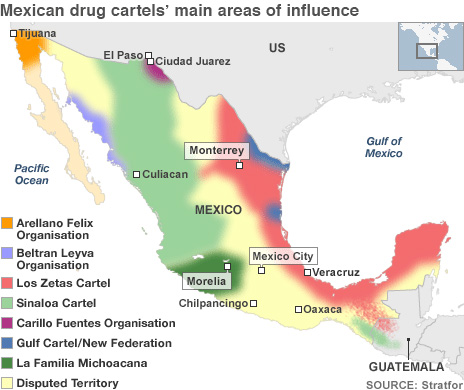
|  |  |  Editorials | Issues Editorials | Issues  
'No Alternative' to Mexico's Drug War - Says Calderon
 Stephen Sackur - BBC News Stephen Sackur - BBC News
go to original
October 27, 2010


| | President Calderon says the US is fuelling Mexico's violence because it provides the market for drug dealers. |  |
Mexican President Felipe Calderon has said he will continue his war on the country's drug cartels until the country is safe, despite the tens of thousands of deaths it has already cost.

Mexicans are about to mark the Day of the Dead. Skulls and skeletons adorn storefronts, hotel lobbies, even a corner of the grand hall in the Los Pinos presidential mansion in Mexico City.

Traditionally the Dia de los Muertos is a time to remember deceased family and friends. It is a day of prayers and parties - Mexicans know how to laugh, even in the face of death.

But maybe not this year. Because in Mexico today spine-tingling horror is not a holiday confection; it is everyday reality.

Consider the latest headlines from the north of the country. In Ciudad Juarez gunmen burst into a house party last Friday night. Fourteen young people were shot dead, dozens more including a nine-year-old boy were wounded.

Two days later another massacre; this time in Tijuana - 13 residents in a drug rehabilitation clinic were lined up by assassins and killed in a hail of bullets.

If these stories sound familiar, it is because they follow a grim pattern.

In the last four years nearly 30,000 Mexicans have been killed in an orgy of violence driven by narco-trafficking, gangsterism and organised crime.

More than 2,000 people have been murdered in the city of Ciudad Juarez alone.

'No alternative'

The escalating body count can be traced back to a political decision. President Calderon assumed office four years ago with a promise to eliminate the drugs cartels once and for all.

He ordered the Mexican army and the federal police into the fight. Thousands of heavily armed troops moved into the narco heartlands close to the US border. A hornet's nest was kicked, and sure enough the president has been badly stung.

But if he is smarting, he is not letting on. When I met him in the library of his official residence, he was in combative mood.

The recent massacres in the north "reinforce our determination to fight and defeat those criminals" he told me. "These are crazy and the government must act with the full force of the state against them. I will not rest until Mexico is safe".

But President Calderon's war on the narco-traffickers has exposed the failings of the Mexican state.

Local police and politicians have long been in the pay of the cartels. The president says "cleaning house" is now a key component of the campaign against organised crime. He talks not just of reforming the police and the judiciary, but also of ending years of social neglect; rebuilding public faith in the state.

All of which will take years. And in the meantime the death toll mounts. "It is painful," the president concedes, "but there is no alternative".

Fraught relationship

Mexican human rights campaigners struggle to see how deploying the army to combat the cartels strengthens civil society.

Indeed accusations of abuses by soldiers are piling up in the office of the National Commission for Human Rights.

The US Government is withholding a token $26m (£16m) of promised assistance until Mexico does more to safeguard against military excesses.

Mention of this sees the mild-mannered President Calderon visibly agitated. He is in no mood to be lectured by the United States government.

"Why do we have narco-trafficking?" he asks. "Because we are living beside the largest consumer of drugs in the world (the US) and everyone wants to sell him drugs through my window, through my door." He adds that the assault rifles that flood into his country also come from the US. "They have a clear responsibility in this," he says.

The US-Mexico relationship has always been fraught, and it still is. Grave concern about instability in Mexico - and the implications for illegal immigration and cross border violence - prompted Washington to offer $1.5bn (£1bn) of military assistance. "Intelligence sharing," President Calderon calls it, though he categorically denies that the US is running surveillance operations over Mexican territory.

Killing zones

Is there a risk of Mexico becoming a failed state? It is a question which has been mooted in Washington, but it draws nothing but scorn from Felipe Calderon.

"Latest figures show our economy is growing at 7%," he tells me. "Exports are up and the outlook is bright. There is no comparison to be made between our situation and Colombia, or Pakistan".

Mexican officials tirelessly point out that the vast majority of those killed in the last four years have been associated with organised crime.

The "killing zones" have been concentrated in a relatively small number of cities and regions.

Both points have some merit, but they fail to capture the corrosive effect the violence is having on confidence - both within Mexico and outside.

A recent report from Credit Suisse Bank put it bluntly: "Crime has become a clear threat to the strength of the recovery; the cost of doing business in Mexico has risen."

Significantly the key industrial city of Monterrey has seen 600 murders this year and the local chamber of commerce reports that 60% of local businesses have faced threats of extortion.

There are also disturbing signs that the violence is moving closer to Mexico City.

I journeyed 50 miles south of the capital to the resort town of Cuernavaca known as the City of Eternal Spring.

This year it has been a city of sporadic violence. A vicious turf war between rival cartel factions has seen mutilated bodies dumped in Cuernavaca's streets and hung from local bridges.

Earlier this year locals received a warning to keep off the streets or risk death. For weeks afterwards business in bars and restaurants was badly hit.

But when I arrived there were crowds in the streets enjoying a local food festival.

A tourism official assured me that "the difficulties were over".

But I later met Grisel, a young teacher. "I've changed the way I behave," she tells me. "I'm much more wary, especially if I'm out at night. People are worried, the parents at school, everybody".

And does she have a message for her president?

"Calderon needs to open his eyes," she says. "His drugs war was a major mistake. He says he can solve the problem, but Cuernavaca was known for its peace, and now it's known for violence."

 |

 |
|  |



